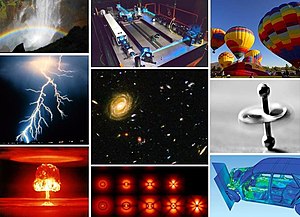
Back Fisika ACE Fisika Afrikaans Physik ALS የተፈጥሮ ሕግጋት ጥናት Amharic Fisica AN जीव-विज्ञान ANP فيزياء Arabic ܦܝܣܝܟ ARC فيزيك ARY فيزيا ARZ

Physics is a branch of science. It is one of the most fundamental scientific disciplines. The main goal of physics is to explain how things move in space and time and understand how the universe behaves. It studies matter, forces and their effects.
The word physics comes from the Greek word ἡ φύσις, meaning "nature".[1] Physics can also be defined as "that department of knowledge which relates to the order of nature, or, in other words, to the regular succession of events".[2]
Physics is very important in engineering and developing new technologies, such as aviation, electronics and weapons. One reason for starting the mathematical field of calculus was to help develop mechanics, a branch of physics.
Modern physics connects ideas about the four laws of symmetry and conservation of energy, momentum, charge, and parity.
Astronomy, now a part of physics, is the oldest natural science. In the past it was a part of 'natural philosophy' with other fields of science, such as chemistry and biology. During the scientific revolution, these fields became separate, and physics became a distinct field of knowledge.
- ↑ At the start of The Feynman Lectures on Physics, Richard Feynman offers the atomic hypothesis as the single most important scientific concept, that all things are made up of atoms – little particles that move around in perpetual motion, attracting each other when they are a little distance apart, but repelling upon being squeezed into one another ..."
- ↑ Maxwell J.C. 1878. Matter and motion. Van Nostrand, p9. ISBN 0-486-66895-9